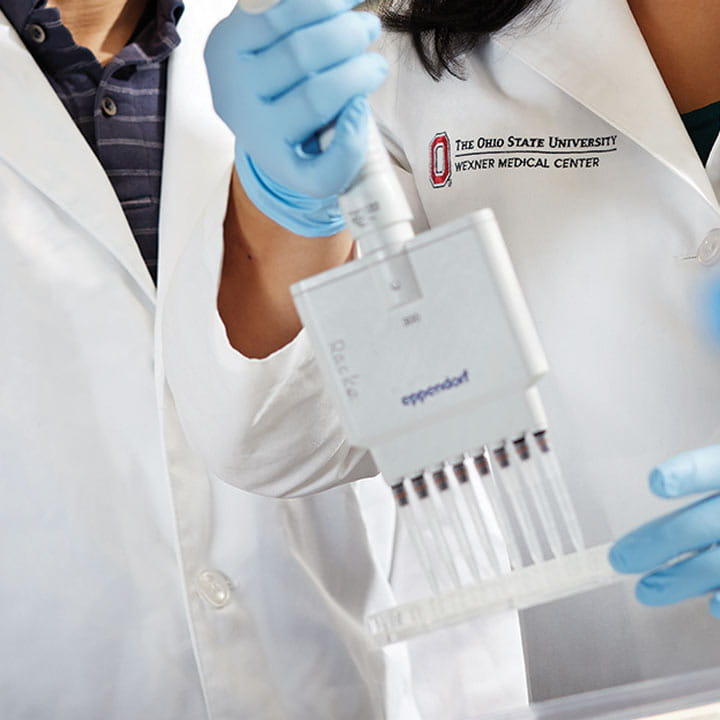
Researchers take next steps to understand COVID-19’s impact on people infected during pregnancy
 The U.S. Department of Defense (DOD) has awarded a pair of grants totaling approximately $2.65 million to help The Ohio State University Comprehensive Cancer Center – Arthur G. James Cancer Hospital and Richard J. Solove Research Institute (OSUCCC – James) researchers identify cellular biomarkers that could lead to earlier detection of endometrial (uterine) and ovarian cancer.
The U.S. Department of Defense (DOD) has awarded a pair of grants totaling approximately $2.65 million to help The Ohio State University Comprehensive Cancer Center – Arthur G. James Cancer Hospital and Richard J. Solove Research Institute (OSUCCC – James) researchers identify cellular biomarkers that could lead to earlier detection of endometrial (uterine) and ovarian cancer.
A four-year, $1.94 million grant from the DOD Peer-Reviewed Cancer Research program will address gaps in early detection and diagnosis of endometrial cancer (EC), the fourth most common cancer among people in the United States. Although EC incidence is rising, no blood tests are available to screen for diagnosis or recurrence of this disease.
Similarly, a three-year, $710,000 grant from the DOD Ovarian Cancer Research Program will enhance efforts for earlier detection of high-grade serous ovarian cancer (HGSOC), which accounts for more than 75% of all epithelial ovarian cancer and is usually diagnosed at advanced stages due to a lack of screening and early-detection methods.
In both grant-funded studies, scientists led by principal investigator Selvendiran Karuppaiyah, PhD, associate professor in the Department of Obstetrics and Gynecology in the Ohio State College of Medicine and a member of the Translational Therapeutics Program at the OSUCCC – James, will focus on exosomes — nano-sized vesicles that are released by a variety of cells in the body and are an attractive source of biomarkers.
“As opposed to larger cell components that have been previously hypothesized to be useful in cancer identification, exosomes are more specific to cancer cells, and they tend to be more stable and not degrade easily like others,” Dr. Karuppaiyah says. “Also, because they are extremely small and are less complex than other cell components, we believe they can be identified as being cancer-cell specific, allowing for better efficacy in screening and maintenance.”
In project abstracts, the researchers state that no known biomarkers have proven effective for screening or early detection of EC or HGSOC because most of them lack specificity and can’t be obtained using technology that can be relied on for both efficiency and reproducibility.
“While many protein-based biomarkers have been identified, they haven’t been confirmed in subsequent studies. This is why exosomal proteins are an attractive source of biomarkers,” they write, noting that this will be the first study to explore the clinical implications of a set of exosomal proteins that these scientists have identified in preliminary studies. They plan to expand on that set with further screening of exosomal proteins in patient samples that they’ll obtain from three institutions, including the OSUCCC – James.
Further, the scientists explain that their studies will use a novel microfluidic-based device they’ve developed for isolating exosomes from patient serum. They believe their device “is more efficient and has greater purity and specificity than conventional methods. This superior method of isolation is a critical step toward translating our findings to widespread use in the clinical setting.”
“Our studies will circumvent the limitations encountered by previous studies and will significantly advance our ability to find and validate biomarkers for detecting these cancers in earlier stages, when they are more easily treatable,” Dr. Karuppaiyah says. “Effective screening and earlier diagnosis will substantially decrease morbidity and mortality among women with endometrial cancer or HGSOC.”